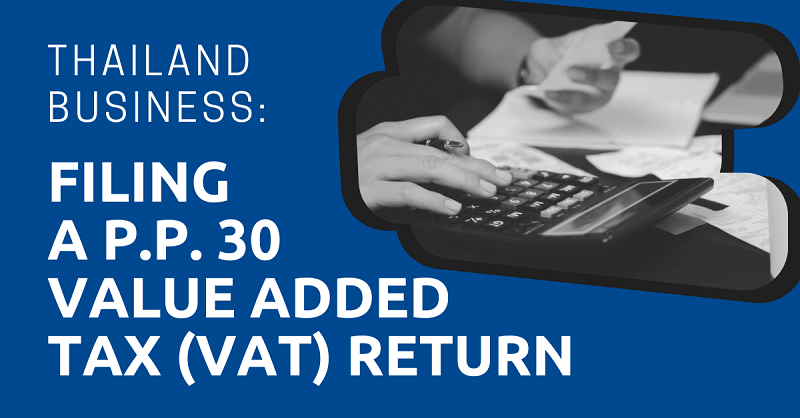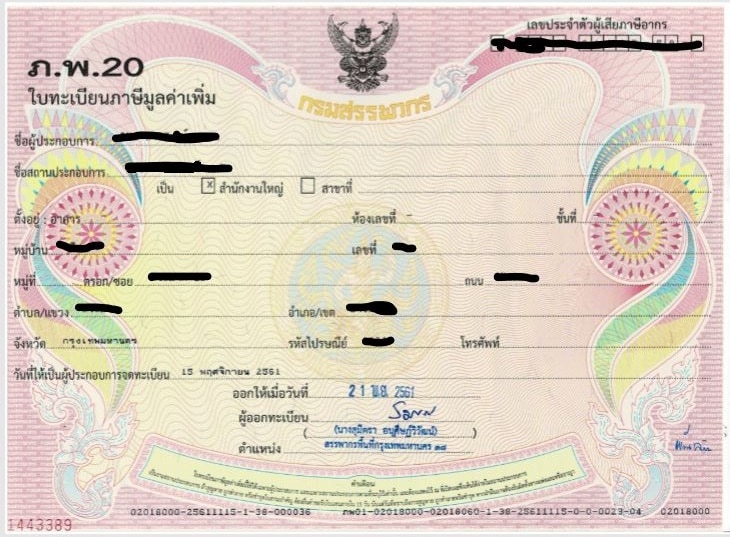
In Thailand, you’ll want to register your company for VAT if you anticipate you’ll cross the annual VAT registration threshold of 1.8 million THB per annum.
This will make you liable to file the P.P. 30 or Value Added Tax (VAT) Return form monthly.
The P.P. 30 (Phor Por 30 in Thai) is part of the Thai Revenue Department’s VAT system. Before you can file a P.P. 30, you will need to register your company for VAT and obtain a VAT registration certificate or P.P. 20.
"*" indicates required fields
Disclaimer: This article may include links to products or services offered by ExpatDen’s partners, which give us commissions when you click on them. Although this may influence how they appear in the text, we only recommend solutions that we would use in your situation. Read more in our Advertising Disclosure.
Contents
We have exclusive business content with insider business tricks that you can’t find anywhere else.
By becoming a subscriber of our Business tier, you can get immediate access to this content:
- Karsten’s List of Personal and Professional Services
- A Step-by-Step Guide to Registering a Company in Thailand on Your Own
- Taxes You Have to Deal with as a Business Owner in Thailand
- Employee Regulations You Must Know as a Business Owner
- Increase Your Chances of Getting Tax Refunds for Your Company
That’s not all. You get a free consultation with a corporate lawyer, a free consultation with an accountant, enjoy ExpatDen ad-free, and get access to over a hundred pieces of exclusive content to make your life in Thailand hassle-free.
Here is the full list of our exclusive content.
To get access to these exclusive business guides and more, become a subscriber.
What Is It?
P.P.30 is a form for VAT return in Thailand. You need to file it every month to the Revenue Department, for both paying VAT or getting VAT return.
Who Needs to File It?
Everyone who has a VAT certificate. It can be individuals, companies, or companies promoted by the Board of Investment.
Basically, after you start your business in Thailand and have revenue over 1.8 million baht per year, you need to register for VAT. Then, you need to add VAT to all of your services and report that every month to the Revenue Department via P.P. 30 form.

you need to file P.P.30 every month.
Even if you owe no VAT, the P.P. 30 form must still be filed monthly. Fill it out and submit it along with all the original purchase invoices and copies of the sales tax invoices to the Revenue Department physically or via e-filing.
Another useful link: How to Get a VAT Registration Certificate in Thailand as a Business Owner
How to Prepare P.P.30
You can get an English copy of the P.P. 30 VAT form from the Revenue Department website.
Within the form, you need to list out the total amount of input tax, output tax, and also any tax credits you have that month.
The VAT to be remitted will be derived from the sales tax that comes from selling products or services in that month, minus the input tax on company expenses related to the month’s business operations.
Input tax invoices have a six-month validity to be used to offset sales VAT.
At the end of the form, you need to fill out the total amount of tax you need to pay or return.
Although it’s possible to do it yourself, it’s better to hire an accountant to prepare and file the P.P. 30 form for your company.
This is to prevent any penalty for filing incorrect information. The accountant can also help you talk with a Revenue Department officer when they have any questions with the form – which is really helpful unless you can speak Thai fluently.
Another useful link: Get the Right Company for Accounting Service in Bangkok, Thailand
Accounting Firms in Thailand
Banchee Legal House

A law firm in Bangkok with a broad range of legal and business services to offer their clients.
Contact Banchee Legal HouseSupporting Documents for P.P.30
To prepare the P.P.30, you need to send all of the sales tax invoices and input tax invoices of that month to your accountant.
Tax invoices need to include all of this information:
- Company name on both parties
- Company address on both parties
- Company VAT ID on both parties
- Order description
- The total amount of sales and tax
After that, an accountant will make a report for the P.P.30 and send them to the Revenue Department along with the P.P.30 form and copies of tax invoices when the Revenue Department asks for them.
How to File P.P.30
There are two ways you can file P.P.30. You can file it on paper at your local Revenue Department. Or you can e-file it through the E-Filing website.
E-filing is much more convenient. You just need to choose the P.P.30 form and file it digitally. You can also upload supporting documents there.
After that, you can save the file to your company for a record.
You can create a separate account and send it to your accountant to file it for your company. If you use an accountant to open your company and register for VAT, they may already create an account for you.
In addition, you can also file other types of corporate tax through this website as well.
Another helpful link: Taxes You Have to Deal with as a Business Owner in Thailand
How to Pay Tax
After you file the P.P.30 form, you can pay tax directly to a local Revenue Department or make a bank transfer.
How to Get Tax Return
To get a tax return, there are three options: it can be in cash (if you file it at a local Revenue Department), via bank transfer, or get a tax credit for tax filing next month.
Another helpful Link: Increase Your Chances of Getting Tax Refunds
When to File Your VAT
Any VAT accumulated in a month must be filed before the 15th day of the following month (i.e. all trading activity in January must be filed by February 15th).
It is important to note again that you need to file P.P.30 every month although you owe no VAT on that month. You just need to enter “0” on input tax, output tax, and the total amount of tax you need to pay.
If the 15th falls on a Saturday, Sunday or a public holiday, the form is due on the next working day.
Another helpful link:
When and How to File Taxes as a Business Owner in Thailand
Late Fines
There are severe penalties for not filing company taxes according to schedule. It is important to complete the VAT return on time to avoid penalties, and accurately to prevent having to file amended returns.
There are late submission fines of 300 baht for the first seven days and 500 baht after that. A late submission penalty up to 20% of twice the amount of VAT due that month is also excised – this includes months where VAT was not filed, or filed incompletely (up to 20% of the VAT due) – depending on the number of days that has passed, plus a surcharge of 1.5 percent of the total tax payable for that month.
Other types of aberrant VAT filing or non-compliance can also lead to penalties up to twice the amount of VAT due.
If no tax is owed for a certain month, there is no penalty fee or surcharge, but the criminal fine is still applicable.
Another helpful link: Taxation in Thailand: 6 Common Mistakes
Now, on to You
Handling company accounting in Thailand – filing VAT returns and claiming VAT deductions – can be complex, especially if you don’t speak Thai. Become aware of the taxes you are liable for as a business owner, and don’t fall prey to common accounting mistakes.
Remember that with the help of local accounting firms who know the ins and outs of the Thai accounting system and are experienced in dealing with the Thai Revenue Department, you can stay in compliance with little to no headache even without a large accounting budget.








Hello Expatden,
I have read your article. It is really helpful but I cannot find the explanation of where to submit the PP20. It would be nice to share the webiste link in your article.
Thanks
PP20 is a vat registration certificate. To get it, you need to submit PP01 at your local revenue department. Please read this article for more information: https://www.expatden.com/thailand/vat-registration-thailand/